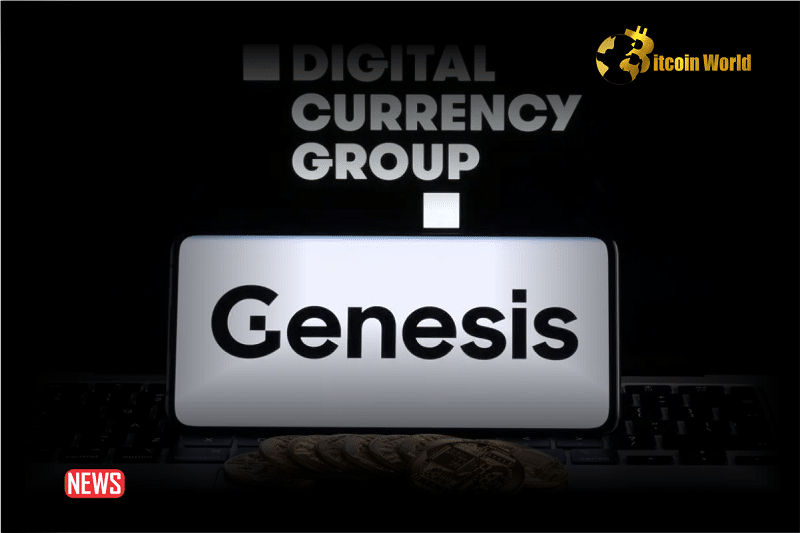The crypto world is closely watching the unfolding bankruptcy saga of Genesis, a prominent crypto lender. In a recent legal twist, a judge has delivered a ruling that could significantly impact Genesis’s future. What exactly happened, and what does it mean for Genesis and its parent company, Digital Currency Group (DCG)? Let’s dive into the details.
Court Blocks DCG from Altering Genesis Ownership – What’s the Big Deal?
In a nutshell, a judge has decided to put a hold on Digital Currency Group (DCG) making any ownership changes within Genesis. This isn’t just a minor procedural step; it’s a protective measure put in place while DCG navigates its own bankruptcy proceedings. But why is this important for Genesis?
This ruling, officially documented here, essentially acts as a shield for Genesis. It ensures that Genesis remains within DCG’s tax consolidated group. This might sound technical, but it unlocks crucial benefits for the struggling crypto lender, especially during its bankruptcy.
Key Benefits of the Court’s Decision:
- Tax Advantage Preservation: The primary benefit is safeguarding Genesis’s access to valuable tax advantages under DCG’s umbrella. This is especially critical during financial hardship.
- Protection of Net Operating Loss (NOL) Carryforwards: Staying within the DCG tax group allows Genesis to maintain and potentially utilize significant Net Operating Loss (NOL) carryforwards.
- Financial Stability During Bankruptcy: These benefits provide a degree of financial stability and breathing room for Genesis as it works through its Chapter 11 bankruptcy plan.
This protection is not indefinite. It will remain in place until one of two scenarios occurs:
- Effective Date of a Chapter 11 Plan: If Genesis successfully proposes and implements a Chapter 11 bankruptcy reorganization plan, the protection will last until this plan takes effect.
- Conversion to Chapter 7 Liquidation: If the bankruptcy case unfortunately transitions to a Chapter 7 liquidation, meaning the business is wound down and assets are sold off, the protective benefits will also cease.
Why Did Genesis Fight for This Ruling?
Genesis didn’t just stumble upon this ruling; they actively argued for it since late November. Their core argument revolved around maintaining DCG’s stake above 80%. Why 80%? This threshold is critical for preserving the potential value tied to the federal net operating loss (NOL) carryforwards within the DCG Group. In simpler terms, Genesis needed DCG to remain a significant owner to keep these valuable tax benefits.
Understanding Net Operating Loss (NOL) Carryforwards
Let’s break down NOLs. Imagine a business experiences losses in one year. NOL carryforwards are like a tax ‘rainy day fund.’ They allow a company to deduct those past losses from future profits, effectively reducing their tax burden when they become profitable again. For a company like Genesis trying to recover from financial distress, these NOLs can be a lifeline.
Genesis estimates these NOLs to be over a staggering $700 million! These losses are largely attributed to the unfortunate collapse of digital asset hedge fund Three Arrows Capital (3AC). 3AC’s failure to repay loans from Genesis Asia Pacific played a significant role in Genesis’s financial woes and subsequent bankruptcy.
Genesis’s Bankruptcy Journey: A Recap
Genesis officially filed for Chapter 11 bankruptcy in January, a domino effect triggered by the massive FTX collapse that shook the crypto industry. However, Genesis’s troubles didn’t end with the bankruptcy filing. They became embroiled in complex disputes, most notably with Gemini, another major player in the crypto space.
The Gemini Earn Program Saga
The heart of the Genesis-Gemini dispute lies in the Earn program, a now-suspended initiative that offered users interest on their crypto holdings. When financial turmoil hit, withdrawals were frozen, leaving users in limbo.
The numbers involved are substantial:
- Gemini Customers Seeking $1.1 Billion: Gemini is seeking a massive $1.1 billion on behalf of approximately 230,000 Earn program customers.
- Genesis Pursuing $689 Million from Gemini: Conversely, Genesis is also pursuing a significant sum of $689 million from Gemini.
This legal battle highlights the intricate web of liabilities and claims in the wake of crypto market volatility.
New York Attorney General Enters the Fray
Adding another layer of complexity, DCG, Genesis, and Gemini are facing a lawsuit from the New York Attorney General. The lawsuit alleges a “fraudulent scheme” connected to the Earn product. This legal action further intensifies the scrutiny and challenges facing these crypto giants.
Looking Ahead: What Does This Mean for the Future?
The court’s decision to restrict DCG’s ownership changes in Genesis is a significant win for Genesis in the short term. It provides a crucial layer of financial protection as they navigate the complexities of bankruptcy. However, the long-term future remains uncertain. Genesis still faces significant hurdles, including resolving disputes with creditors like Gemini, navigating the bankruptcy process, and addressing the allegations in the New York Attorney General’s lawsuit.
The crypto industry will be watching closely to see how Genesis navigates these challenges and whether this court ruling can pave the way for a successful restructuring and eventual recovery. The case serves as a stark reminder of the interconnectedness and potential risks within the digital asset ecosystem.
See Also: CertiK Warns OKX Users To Update Their iOS App Now
Disclaimer: The information provided is not trading advice, Bitcoinworld.co.in holds no liability for any investments made based on the information provided on this page. We strongly recommend independent research and/or consultation with a qualified professional before making any investment decisions.




